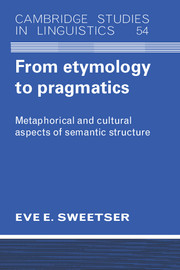Book contents
3 - Modality
Published online by Cambridge University Press: 05 June 2012
Summary
Introduction
In the preceding chapter I have argued that a pervasive and coherently structured system of metaphors underlies our tendency to use vocabulary from the external (sociophysical) domain in speaking of the internal (emotional and psychological) domain. Historically, this metaphorical system has guided the course of numerous semantic changes; and synchronically, it is represented by numerous polysemous words and extended “abstract” uses of physical-world vocabulary. In this chapter I shall examine in detail one particular vocabulary domain which shows synchronic ambiguity between the external and internal worlds: modality.
The ambiguity of modal expressions between “root” (or deontic) and epistemic senses has long been recognized. Linguists have characterized as root those meanings which denote real-world obligation, permission, or ability (as in example [1]); and as epistemic those which denote necessity, probability, or possibility in reasoning (as in [2]).
(1) John must be home by ten; Mother won't let him stay out any later.
(2) John must be home already; I see his coat.
This ambiguity is not peculiar to English; indeed, there is an evident crosslinguistic tendency for lexical items to be ambiguous between these two sets of senses. Many unrelated languages (Indo-European, Semitic, Philippine, Dravidian, Mayan, and Finno-Ugric, among others are alike in having some set of predicates which carry both the root and epistemic modal meanings, as English modal verbs do. Frequently this set of predicates is a relatively small, morphosyntactically distinct set, also as in English. Such a crosslinguistic correlation encourages us to search for a broader motivation in the linking of these two apparently disparate semantic domains.
- Type
- Chapter
- Information
- From Etymology to PragmaticsMetaphorical and Cultural Aspects of Semantic Structure, pp. 49 - 75Publisher: Cambridge University PressPrint publication year: 1990
- 1
- Cited by



